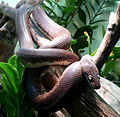Liasis mackloti
| Liasis mackloti | |
|---|---|

| |
| Liasis mackloti savuensis | |
| Scientific classification | |
| Domain: | Eukaryota |
| Kingdom: | Animalia |
| Phylum: | Chordata |
| Class: | Reptilia |
| Order: | Squamata |
| Suborder: | Serpentes |
| Family: | Pythonidae |
| Genus: | Liasis |
| Species: | L. mackloti
|
| Binomial name | |
| Liasis mackloti A.M.C. Duméril & Bibron, 1844
| |
| Synonyms | |
| |
Liasis mackloti, commonly known as Macklot's python[2] or the freckled python,[3] is a species of python, a non-venomous snake in the family Pythonidae. The species is endemic to Indonesia, East Timor, Papua New Guinea, and coastal northern Australia. Three subspecies are recognized, including the nominate subspecies described here.[3]
Etymology
[edit]The specific name, mackloti, is in honor of naturalist and taxidermist Heinrich Christian Macklot.[4]
Description
[edit]Attaining 7 ft (2.13 m) or more in total length (including tail), Macklot's python is large and if not treated properly can be a poor-tempered snake. Its coloration consists of a blackish-brown to green base color, with yellow to ochre sides, and a white belly that is patterned with small and dispersed yellow spots or black speckles, while the labial scales are pale in color.
Reproduction
[edit]Liasis mackloti is known to breed easily in captivity.[2] It is oviparous.[3]
Geographic range
[edit]Liasis mackloti is found in Indonesia in the Lesser Sunda Islands of Savu, Roti, Samao, Timor and Wetar, in East Timor, Papua New Guinea, and coastal northern Australia.[3] The type locality given is "les îles de Timor et de Samao ". Brongersma (1968) restricted the type locality to "Timor" by lectotype designation.[1]
Subspecies
[edit]| Subspecies[3] | Taxon author[3] | Common name | Geographic range |
|---|---|---|---|
| L. m. mackloti | A.M.C. Duméril & Bibron, 1844 | Macklot's python | Timor and Wetar, East Nusa Tenggara |
| L. m. dunni | Stull, 1932 | Dunn's python | |
| L. m. savuensis | Stull, 1932 | Savu python | Savu, East Nusa Tenggara |
Exotic trade and captive care
[edit]Liasis mackloti is a snake that is known and sold in the live exotic animal trade, bringing it far beyond its native range, to as far as the United Kingdom, and North America, where it is sold and kept in captivity from pet stores, speciality shops, and conventions.
Gallery
[edit]
References
[edit]- ^ a b McDiarmid RW, Campbell JA, Touré TA (1999). Snake Species of the World: A Taxonomic and Geographic Reference, Volume 1. Washington, District of Columbia: Herpetologists' League. 511 pp. ISBN 1-893777-00-6 (series). ISBN 1-893777-01-4 (volume).
- ^ a b Mehrtens JM (1987). Living Snakes of the World in Color. New York: Sterling Publishers. 480 pp. ISBN 0-8069-6460-X.
- ^ a b c d e f Liasis mackloti at the Reptarium.cz Reptile Database. Accessed 30 June 2017.
- ^ Beolens, Bo; Watkins, Michael; Grayson, Michael (2011). The Eponym Dictionary of Reptiles. Baltimore: Johns Hopkins University Press. xiii + 296 pp. ISBN 978-1-4214-0135-5. (Liasis mackloti, p. 165).
Further reading
[edit]- Boulenger GA (1893). Catalogue of the Snakes in the British Museum (Natural History). Volume I., Containing the Families ... Boidæ ... London: Trustees of the British Museum (Natural History). (Taylor and Francis, printers). xiii + 448 pp. + Plates I-XXVIII. (Liasis mackloti, p. 79).
- Duméril A-M-C, Bibron G (1844). Erpétologie générale ou Histoire naturelle complète des Reptiles, Tome sixième [= General Herpetology or Complete Natural History of the Reptiles, Volume 6 ]. Paris: Roret. xii + 609 pp. (Liasis mackloti, new species, pp. 440–442). (in French).






